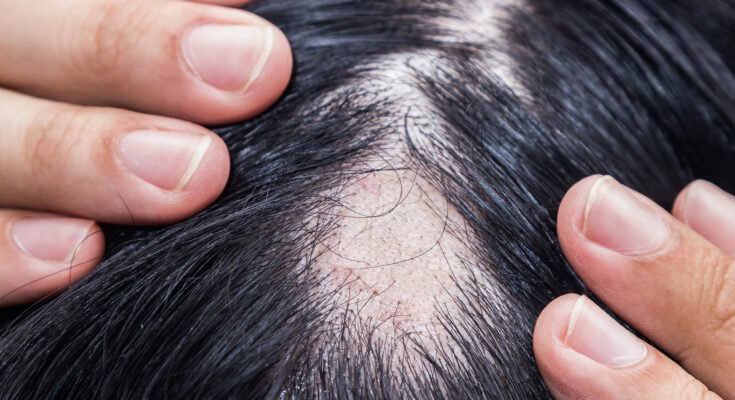Introduction
Hair fall is a common concern for many men. It’s not just about losing hair—it’s about losing confidence and self-esteem. Understanding the root causes of hair fall can help you address it more effectively and maintain healthy, vibrant hair. This blog post will explore the top ten causes of hair fall in men and provide actionable solutions to tackle each one.
Common Causes of Hair Fall in Men
Genetic Factors
Genetics play a significant role in hair fall. If your father or grandfather experienced hair loss, chances are you might too. Male pattern baldness, also known as androgenetic alopecia, is hereditary and usually occurs gradually, starting with thinning at the temples and crown.
Studies reveal that around 80% of men will experience some degree of hair loss by the age of 50. Genetic testing can help determine your risk and guide you towards preventive measures. Understanding your family history is the first step in combating hair fall.
Real-life examples abound—think of celebrities like Prince William or Elon Musk, who have openly discussed their struggles with hair loss. These cases highlight the universal nature of this issue.
Hormonal Imbalance
Hormones significantly impact hair health. Dihydrotestosterone (DHT), a derivative of testosterone, is a primary culprit in male hair loss. High levels of DHT can shrink hair follicles, leading to thinner hair and eventual hair loss.
Medical studies show that hormonal imbalances can exacerbate hair fall, especially in those already genetically predisposed. Addressing hormonal imbalance involves consulting with healthcare providers who can recommend treatments like finasteride or other DHT-blocking medications.
For instance, many men who have struggled with DHT-related hair loss have found success with medical treatments. Ensuring hormonal balance can lead to healthier hair growth over time.
Nutritional Deficiencies
Your diet plays a crucial role in maintaining healthy hair. Deficiencies in essential nutrients like iron, zinc, vitamins A, E, and D can lead to hair fall. Ensuring you get a balanced diet rich in these nutrients can significantly impact your hair health.
Research indicates that diets lacking in specific vitamins and minerals can contribute to hair shedding. Including foods like leafy greens, nuts, seeds, and fish in your diet can bolster hair health.
Personal testimonies often stress the importance of nutrition in hair care. Many have seen improvements in hair growth after making dietary adjustments and incorporating supplements.
Stress and Anxiety
Stress is a silent hair killer. Chronic stress can trigger a condition called telogen effluvium, where stress pushes hair follicles into a resting phase, causing hair to fall out more easily.
According to numerous studies, stress-related hair loss is temporary but can become chronic if not managed properly. Practices like mindfulness, yoga, and regular exercise can help mitigate stress and promote better hair health.
Individuals who have incorporated stress-reducing techniques into their daily routines often report not only improved hair health but overall well-being. Controlling stress is key to maintaining a full head of hair.
Poor Hair Care Practices
Improper hair care can lead to hair fall. Over-washing, using harsh shampoos, and neglecting proper conditioning can weaken hair strands and lead to breakage.
Experts recommend washing hair two to three times a week with a gentle shampoo and conditioner. Avoid heavy styling products and minimize the use of heat-styling tools to reduce hair damage.
Many men overlook the importance of proper hair care. Testimonials often reveal that adopting a gentler hair care routine has led to noticeable improvements in hair strength and volume.
Medical Conditions
Certain medical conditions like thyroid disorders, autoimmune diseases, and scalp infections can contribute to hair fall. Conditions like alopecia areata cause the body’s immune system to attack hair follicles, leading to patchy hair loss.
Medical research highlights the connection between these conditions and hair loss. Proper diagnosis and treatment of underlying medical issues are crucial for managing hair fall.
Real-life examples include individuals diagnosed with thyroid imbalances who saw hair regrowth after appropriate medical intervention. Addressing medical conditions is essential for hair recovery.
Side Effects of Medications
Some medications list hair loss as a side effect. Drugs for conditions like hypertension, depression, and high cholesterol can contribute to hair shedding.
Research shows that while medication-induced hair loss is often temporary, consulting with a healthcare provider for alternative medications or dosage adjustments can help manage this issue.
Testimonials from men who have experienced medication-induced hair loss often emphasize the importance of working with healthcare providers to find suitable alternatives.
Environmental Factors
Pollution, UV radiation, and exposure to harsh weather conditions can weaken hair and lead to hair fall. These environmental factors can damage the hair shaft and scalp, resulting in increased hair shedding.
Studies suggest that environmental pollutants can disrupt the natural hair growth cycle. Using protective hair products and covering your hair when exposed to harsh conditions can mitigate these effects.
Personal stories often highlight the positive impact of using protective measures like hats and UV-protectant sprays on hair health. Shielding your hair from environmental damage is crucial for maintaining its strength.
Aging
Aging naturally leads to hair thinning and loss. As men age, hair growth slows down, and hair strands become finer and less pigmented.
Research indicates that age-related hair loss, also known as senescent alopecia, is a common concern for men over 50. While it cannot be entirely prevented, adopting a healthy lifestyle can slow the process.
Many older men share their experiences of maintaining hair health through balanced diets, regular exercise, and proper hair care routines. Aging gracefully involves taking proactive steps to nurture hair health.
Overuse of Hair Products
Using excessive amounts of hair products like gels, sprays, and waxes can build up on the scalp, clogging hair follicles and leading to hair fall. These products can also dry out hair, making it more prone to breakage.
Studies emphasize the importance of moderation in using styling products. Opting for lightweight, natural hair products can help maintain scalp health and reduce hair fall.
Individuals who have switched to minimalistic hair care routines often report healthier, fuller hair. Reducing product usage is a simple yet effective way to improve hair health.
How to Address Each Cause
Dietary Changes and Nutritional Supplements
Improving your diet is the first step in addressing hair fall. Incorporate foods rich in iron, zinc, vitamins A, E, and D into your meals. Supplements can also help fill nutritional gaps.
Research supports the benefits of a balanced diet on hair health. Consider consulting a nutritionist to tailor a diet plan that meets your specific needs.
Many men have seen positive changes in hair growth and overall health after making dietary adjustments. Nutrition plays a pivotal role in maintaining vibrant hair.
Lifestyle Adjustments to Manage Stress and Anxiety
Managing stress effectively can reduce hair fall. Incorporate stress-relieving activities like meditation, yoga, and regular physical exercise into your routine.
Studies indicate that these practices can significantly reduce stress levels and promote overall well-being. Additionally, seeking professional help if needed can provide structured support.
Personal stories from men who have adopted stress-management techniques often emphasize the positive impact on both mental health and hair growth. Reducing stress is essential for hair health.
Recommended Hair Care Practices
Adopting proper hair care practices is crucial for reducing hair fall. Use gentle shampoos and conditioners, avoid excessive washing, and minimize the use of heat-styling tools.
Experts recommend a simple hair care routine that includes regular trimming and avoiding tight hairstyles that can pull on hair strands. Gentle care nourishes the scalp and promotes healthy growth.
Many men have experienced significant improvements in hair strength and volume by following these recommendations. Proper hair care is a foundational aspect of maintaining healthy hair.
Medical Treatments and Advice
Consulting a healthcare provider can help diagnose and treat underlying medical conditions contributing to hair fall. Medications like minoxidil and finasteride are commonly prescribed for hair loss.
Medical research supports the efficacy of these treatments in promoting hair growth and reducing hair fall. Regular consultations ensure personalized and effective treatment plans.
Testimonials from men who have undergone medical treatments often highlight the importance of professional guidance in managing hair loss. Medical advice is crucial for addressing persistent hair fall.
Advice on Choosing Hair Products Wisely
Selecting the right hair products is essential for maintaining hair health. Opt for products with natural ingredients, free from harsh chemicals and sulfates.
Studies suggest that natural hair products are gentler on the scalp and hair, reducing the risk of irritation and hair fall. Reading product labels and reviews can guide you in making informed choices.
Individuals who have switched to natural hair products often report healthier, shinier hair. Choosing the right products contributes significantly to overall hair health.
Conclusion
Understanding the causes of hair fall and taking proactive steps to address them is crucial for maintaining healthy hair. Early detection and action can prevent further hair loss and promote regrowth.
If you’re experiencing persistent hair fall, consulting a healthcare provider for personalized advice is recommended. Remember, every individual’s hair and scalp are unique, and professional guidance can provide tailored solutions.
Share this post with friends who might benefit from these insights and subscribe to our newsletter for more informative content on maintaining healthy hair and overall well-being.
Read also : Early Signs and Symptoms of Cervical Cancer: What to Watch For




